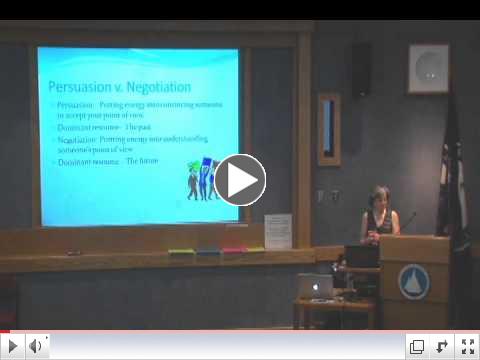Conflict Resolution Newsletter
by Alternative Resolutions, LLC
December 2012 - Vol 2, Issue 11
|
|
|
|
Quick Links
 | | Negotiation Tips |
| |
|
| New website feature: our prior newsletters are now available on our website!!! |
|
Company News and Recent Publications | |
Just published...
Newly Revised Fact shet
The High Cost of Conflict Email us for a copy.
New roster...
Ellen Kandell was recently approved to join the mediator list for Montgomery County Circuit Court custody disputes.
Check out our recent radio interview on mediation and dispute resolution. To listen click here.
|
|
|
|
Greetings! | |

Agreeing to disagree is a short term strategy for intractable conflict which generally can't be solved by many of the tools in the mediator's toolbox. While mediation is one process that can be used, deep understanding of the nature of the parties and the issues is a vital first step. Techniques of nonviolent communication are useful in this arena. In this month's newsletter we explore some characteristics of intractable conflict.
Best wishes for a happy, peaceful holiday season and good health in 2013. |
Understanding Intractable Conflict |
Social conflict
What do we mean by social conflict? Its probably not the kind of conflict that you might experience over a holiday meal. The term refers to societal conflict and is fueled by distrust and dislike of other groups due to differences in attitudes, values and beliefs. While we live in a pluralistic society in the United States as well as most of the world, we need to become more tolerant of different worldviews, ideologies, and moral frameworks so we can live alongside those who are different than ourselves.
Intractable conflict
Intractable conflict is a clash of social, cultural, religious, political and economic philosophies, so it transcends the individuals involved. It can't be resolved by communication and negotiation techniques such as active listening or mediation. These conflicts are characterized by different value systems and incompatible goals. When interpersonal conflict becomes entrenched in a discussion of right versus. wrong, and repeats itself, it is a destructive conflict cycle. (See our June 2011 article on Destructive Conflict).
Intractable issues are persistent. "The pattern of discourse in a conflict involving an intractable issue moves from persuasion to schism." They often fuel themselves and take on a life of their own. The inability to communicate further entrenches the participants. Then people engage in labeling the "other" as subhuman, infidels or perverts. The richness of reasoning, which may have been present initially when some productive communication took place, is replaced by slogans, simple answers and defensive discourse. Ruth Abigail and Dudley Cahn in Managing Conflict Through Communication. Boston, MA: Pearson, 2011. There are a few short term strategies for handling intractable conflict. Using silence or simply ignoring the issue may be a way of coping with it temporarily. Agreeing to disagree is an approach that will work when we can accept the other but continue to think and believe as we do. Ways of addressing "the other" in intractable conflicts In intractable conflicts each side tends to categorize and characterize the other in ways that are destructive and don't promote communication. We demonize the other. Another tactic is to use generalization, attributing characteristics of the group to all, thereby denigrating individuality and humanity. Another tactic that is used is to trivialize and minimize their concerns. Managing conflict through nonviolent communication Nonviolent communication is one way of approaching intractable conflict. At its core nonviolent communication rejects the use of force, such as threats or judgment, in communication It is driven by thinking and language which promote the quality of connection and compassion between the participants. Next month: The Leader as Conflict Manager |
|
|
|
|
Theory Application TIPS | |
TIPS for handling intractable conflict
· Embrace the humanity of the "other"
· Suspend judgment
· Use language that reflects a desire to welcome the other
· Make requests, not demands
· Develop the intent to create a quality of connection
· Observe without evaluating
Do you have questions about this month's article? We'd like to hear from you Email us now! |
|
Conflict Resolution in the Community: Upcoming Events | |

Basic Mediation Training, Spring 2013. Email us for further information.
March 8, 2013 The Ethics of Counseling Your Clients on Workplace Issues, Columbia, MD
March 15, 2013 Expanding Your Practice to Collaborative Counseling, Columbia, MD
Classes in collaboration with Dr. Gloria Vanderhorst.
To register go to http://www.mentalhealthceus.eventbrite.com/ |
|
We look forward to being your partners in productive, proactive conflict resolution endeavors. If you are a new reader or didn't request a copy previously please email us for a free copy of our organizational needs assessment. Put your organization in a conflict healthy environment.
Sincerely,
Ellen |
|
Ellen F. Kandell, Esq.
Alternative Resolutions, LLC
|
|
|
|
|